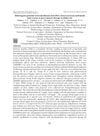4 citations,
May 2023 in “Cells” Baricitinib and its combination with lonafarnib improve fat cell formation in certain genetic disorders.
October 2022 in “Biomedicines” Finasteride in male rats causes liver and metabolic issues in their offspring.
 12 citations,
September 2022 in “Foods”
12 citations,
September 2022 in “Foods” Some nutraceuticals may help in COVID-19 prevention and treatment, but more research is needed.
February 2024 in “Medicina” AFM can diagnose hair disorders by revealing detailed hair surface changes.
 10 citations,
September 2013 in “Veterinary dermatology”
10 citations,
September 2013 in “Veterinary dermatology” Medroxyprogesterone injections caused hair regrowth in some dogs with alopecia X.
 65 citations,
October 2008 in “Journal of Neuroendocrinology”
65 citations,
October 2008 in “Journal of Neuroendocrinology”  36 citations,
January 2014 in “The Journal of Sexual Medicine”
36 citations,
January 2014 in “The Journal of Sexual Medicine” Testosterone may help increase sexual events for women with low libido due to antidepressants.
 34 citations,
November 2017 in “Gynecological Endocrinology”
34 citations,
November 2017 in “Gynecological Endocrinology” A transwoman developed a brain tumor after nine years of hormone therapy, suggesting a possible link between the treatment and tumor development.
 10 citations,
November 2010 in “Journal of Pharmacy Practice”
10 citations,
November 2010 in “Journal of Pharmacy Practice” The document says PCOS is a common hormonal disorder in women, diagnosed by certain criteria, and managed with lifestyle changes and various medications.
 6 citations,
May 1997 in “Journal of Dermatological Science”
6 citations,
May 1997 in “Journal of Dermatological Science” Researchers found a gene in hamsters that responds to male hormones and may be indirectly controlled by them.
 5 citations,
October 2018 in “Journal of Clinical Laboratory Analysis”
5 citations,
October 2018 in “Journal of Clinical Laboratory Analysis” Women with PCOS who have high male hormone levels often also have insulin resistance.
 1 citations,
February 2014 in “Archiv Der Pharmazie”
1 citations,
February 2014 in “Archiv Der Pharmazie” Carbamates may help treat androgen-dependent conditions by changing how certain lipid enzymes are produced.
 1 citations,
March 2012 in “Journal of Dermatological Science”
1 citations,
March 2012 in “Journal of Dermatological Science” Testosterone, progesterone, and levonorgestrel change enzyme levels related to fat production in hamster skin, which could affect skin oil and acne.
 September 1999 in “The Journal of The British Menopause Society”
September 1999 in “The Journal of The British Menopause Society” The document concludes that skin aging in women can be caused by UV exposure and hormonal changes, and treatments like hormone replacement therapy and various skin therapies can help.
54 citations,
October 2010 in “Clinics in dermatology” Diet, especially dairy and high-sugar foods, can cause acne.
61 citations,
April 2018 in “Frontiers in endocrinology” Sex steroids produced in the hippocampus are crucial for brain functions like memory and learning in rodents.
 15 citations,
September 2021 in “Frontiers in Endocrinology”
15 citations,
September 2021 in “Frontiers in Endocrinology” Hormone therapy increases the risk of heart-related issues in transgender women and may affect heart health in transgender men.
 10 citations,
August 2022 in “Journal of clinical sleep medicine”
10 citations,
August 2022 in “Journal of clinical sleep medicine” Transgender youth have more sleep disorders, but gender-affirming therapy may help reduce them.
8 citations,
December 2022 in “International journal of molecular sciences” Mice without the enzyme HSD17B3 still produce normal testosterone, suggesting they have different ways to make it compared to humans.
 March 2024 in “BMC women's health”
March 2024 in “BMC women's health” The levonorgestrel implant increases free testosterone and lowers SHBG more than DMPA-IM and the copper IUD.
July 2011 in “Journal of Pediatric and Adolescent Gynecology” A 15-year-old girl has a skin condition causing blisters on her feet, likely inherited from her family.
1 citations,
March 2021 in “medRxiv (Cold Spring Harbor Laboratory)” Many males in Jordan misuse oral contraceptive pills for hair growth, muscle gain, and acne treatment.
June 2020 in “Research Square (Research Square)” Oral contraceptives with CPA improve overall quality of life for women with PCOS.
 16 citations,
April 2007 in “Journal of Obstetrics and Gynaecology Research”
16 citations,
April 2007 in “Journal of Obstetrics and Gynaecology Research” Prostate-specific antigen may be a new marker for excess male hormones in women with polycystic ovary syndrome.
 December 2020 in “Nigerian journal of animal production”
December 2020 in “Nigerian journal of animal production” Dexamethasone can cause diabetes in rats, and Annona muricata bark extract may help lower blood sugar.
 1 citations,
September 2019 in “Journal of surgery and medicine”
1 citations,
September 2019 in “Journal of surgery and medicine” People with polycystic ovary syndrome have worse meibomian gland and ocular surface conditions.
 January 2023 in “Springer eBooks”
January 2023 in “Springer eBooks” New understanding of hair loss could lead to better treatments.
51 citations,
October 2019 in “Cells” Baricitinib reduces inflammation and improves cell health in premature aging cells.
 36 citations,
April 1990 in “Dermatologic Clinics”
36 citations,
April 1990 in “Dermatologic Clinics” Most pregnant women experience skin changes like darkening and stretch marks, and some may have skin conditions that usually get better after giving birth.
 May 2015 in “Evidence Based Women Health Journal (Online)”
May 2015 in “Evidence Based Women Health Journal (Online)” Inositol was more effective than metformin in improving menstrual cycles and pregnancy rates in PCOS patients.



















